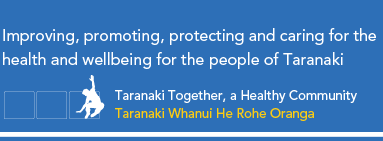Taranaki District Health Board Health Targets 2013-2014 - Fourth Quarter
26 August 2014
![]() The fourth quarter health targets of 2013-2014 have been released by the Ministry of Health.
The fourth quarter health targets of 2013-2014 have been released by the Ministry of Health.
![]() Ministry of Health
Ministry of Health ![]() - Health Targets website
- Health Targets website
The health targets results for the fourth quarter of 2013/14 have been released by the Ministry of Health.
Planning, Funding, and Population Health General Manager Becky Jenkins said a focus on the six key areas is important to continue improve health, reduce inequalities and improve the quality of health services for local people.
This quarter’s results show more people in Taranaki are getting help to quit smoking and getting checked to see if they are at risk of developing diabetes or heart disease.
While there is always room for improvement, these results reflect the hard work of staff in the Taranaki District Health Board and those in the health sector in improving the health of the people of Taranaki.
The health target results for Taranaki DHB are:
1. Shorter Stays in Emergency Departments. Target 95%, Achieved 94%94% of patients seen in Emergency Departments (ED) were discharged or transferred from the ED within six hours, an achievement just below the target of 95%. The number of patients presenting to the ED with minor injuries and illnesses continues to impact on this target. We are actively working with the Midlands Health Network to look at models of service delivery to support patients being seen in the most appropriate setting, such as GP's.
2. Improved Access to Elective Surgery: Target 100%, Achieved 113%We have again achieved over the target of 100% for the population for ‘improved access to elective surgery’ where we have over delivered across a wide range of surgical specialties. Helping to achieve this result, a full review of the preadmission services has resulted in sustained reductions in day of surgery cancellations and an increase in day of surgery admission rates. Significant benefits have also been realised from the implementation of our Enhanced Recovery After Surgery (ERAS) programmes.
3. Shorter Waits for Cancer Treatment: Target 100%, Achieved 100%
This quarter every patient ready for cancer treatment continued to received it within the target of four weeks. We plan to continue our strong performance, and our collaborative relationship with the MidCentral DHB, to maintain this achievement.
4. Increased Immunisation: Target 90%, Achieved 90%
The target of 90% of eight-month-olds were fully immunised this quarter, protecting them from illnesses such as whooping cough. We have worked closely with primary care organisations, hospital services, outreach immunisation services, the National Immunisation Register and Well Child Providers on strategies to improve our immunisation uptake, including early enrolment of newborns with a general practice.
5. Better Help for Smokers to Quit (Hospital Target): Target 95%, Achieved 96%
We continue to work hard to ensure patients and visitors to our hospitals are given advice about quitting smoking, and are pleased to have exceed the target for this quarter.
Better Help for Smokers to Quit (Primary Care Target): Target 90%, Achieved 84%
During this quarter there has been impressive progress on the ‘better help for smokers to quit’ primary care target, with a 12% increase on last quarter. In the past 12 months, over 400,000 patients nationally were offered help to quit smoking during a visit to their GP clinic.
By working hard on our ‘better help for smokers to quit’ targets we are supporting smokers to quit. We are also aiming to improve the health of those around them by reducing exposure to second hand smoke.
6. More Heart and Diabetes Checks: Target 90%, Achieved 88%
This quarter 88% of the eligible population had heart and diabetes checks, an increase of 7% on last quarter. Diabetes and cardiovascular disease remains one of the main causes of ill health in Taranaki and we continue to work hard to provide the best outcomes for these people. The implementation of a multidisciplinary team to support the care provided by GP practices, and the ongoing education of GP’s and practice nurses in the care and management of diabetic patients in the community, are just two examples.
Last updated: Tuesday, August 26, 2014



